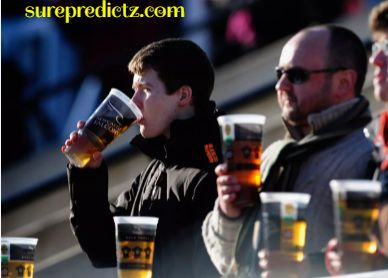Fan-Friendly or Risky Business? The Alcohol Debate in UK Sports
In recent years, the debate surrounding the consumption of alcohol at sporting events in the UK has intensified. While many supporters argue for a more relaxed approach to alcohol consumption in stadiums, others express concern over safety and behaviour. As we examine this issue, it’s worth considering how other countries, particularly Germany, manage alcohol sales at sporting events and the potential benefits and drawbacks for the UK.
A Comparative Look at Germany
Germany is often cited as a successful model for allowing alcohol at sports events. In German football stadiums, fans can purchase beer and other alcoholic beverages, with many clubs even offering specially brewed lagers that enhance the matchday experience. The German Football Association (DFB) has implemented strict regulations to ensure that alcohol consumption does not lead to unruly behaviour. For instance, fans are encouraged to drink responsibly, and there are measures in place to prevent over-serving individuals.
The Case for Alcohol at UK Games
Advocates for allowing alcohol at UK games argue that it could enhance the overall experience for fans. Here are several key points supporting this viewpoint:
- Enhancing the Atmosphere
Allowing alcohol at matches can create a more vibrant atmosphere. Fans often enjoy celebrating their teams with a drink in hand, and this camaraderie can lead to a more enjoyable experience for everyone involved. The social aspect of enjoying a game with a pint is deeply ingrained in British culture.
- Financial Benefits for Clubs
One of the most compelling arguments for allowing alcohol sales at games is the financial boost it could provide, particularly for lower league clubs. Many of these clubs struggle financially and rely heavily on matchday revenues. By permitting alcohol sales, clubs could see a significant increase in income. For instance, it is estimated that allowing alcohol sales could generate an additional £35 million per season across all English Football League (EFL) clubs (Championship, League One, and League Two), which could be reinvested into facilities, player wages, and community initiatives.
- Reducing Pre-Match Drinking
Currently, many fans engage in pre-match drinking at pubs and bars, which can lead to excessive consumption and unruly behaviour upon arrival at the stadium. If alcohol were available inside the stadium, it could help regulate consumption and reduce the risk of alcohol withdrawal symptoms that some fans may experience after a long day of drinking before the match.
Potential Drawbacks
While there are clear benefits to allowing alcohol at games, there are also several concerns that need to be addressed:
- Safety Concerns
The primary concern is safety. There is a fear that allowing alcohol could lead to increased disorderly conduct and violence. Although Germany has managed to maintain order, the UK has a different cultural context that may not easily replicate such success.
- Impact on Families
Another drawback is the potential alienation of families and younger fans. Some parents may be hesitant to bring their children to matches if they perceive the environment as being too boisterous or unsafe due to alcohol consumption.
- Increased Policing Costs
Finally, there is the issue of increased policing costs. If alcohol is allowed, clubs may need to hire additional security personnel to manage potential incidents, which could negate some of the financial benefits.
The debate over whether alcohol should be allowed at sporting events in the UK is complex and multifaceted. Drawing lessons from Germany’s successful model, it is clear that there are significant potential benefits, particularly for lower league clubs that could harness additional revenue to improve their operations. However, the concerns surrounding safety, family environments, and policing costs cannot be ignored.
Ultimately, a balanced approach may be necessary. Perhaps a trial period allowing alcohol sales at certain matches, coupled with strict regulations and monitoring, could provide valuable insights into the impact of such a decision. As the landscape of sports continues to evolve, it is essential for governing bodies to consider innovative solutions that enhance the fan experience while maintaining safety and order. The conversation surrounding alcohol at games is not just about drinks; it’s about creating a culture where fans can enjoy their passion responsibly.














Post Comment